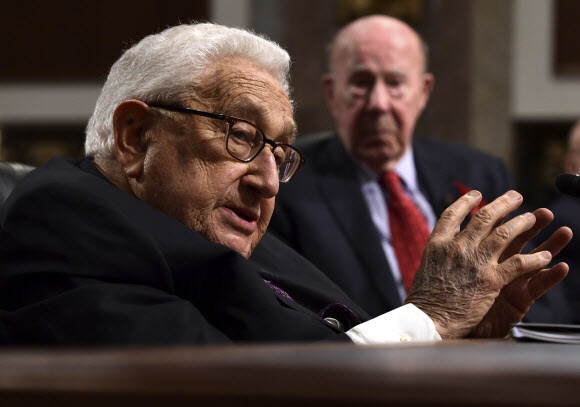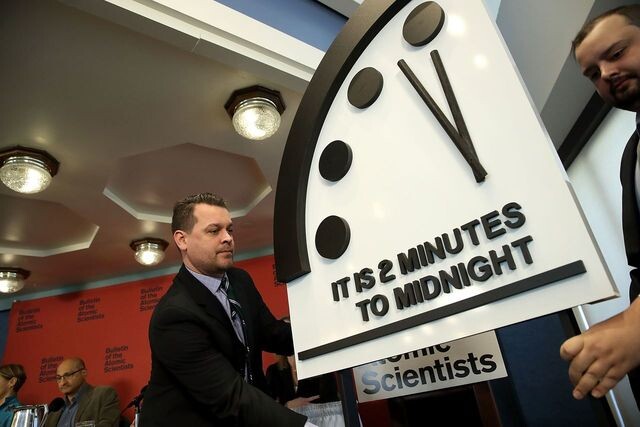hankyoreh
Links to other country sites 다른 나라 사이트 링크
Henry Kissinger suggests a return to the Six Party Talks

Former US Secretary of State and veteran diplomat Henry Kissinger said on Jan. 25 that the best road to denuclearization of the Korean Peninsula was through a return of the existing Six-Party Talks forum. Kissinger added that if that approach fails, an agreement should be sought by the US and China. His remarks came during a Senate Armed Services Forum hearing on national security strategy, where he was joined by fellow former Secretary of State George Shultz and Deputy Secretary of State Richard Armitage.
While acknowledging that the Donald Trump administration’s pressure campaign against Pyongyang last year seemed to have achieved some results, he also noted that there had been no breakthrough on the essence of the issue. As a reason for this, he stressed the weakness of arguments for a greater role from Beijing, saying that while past US administration had appeared to China to solve the problem by halting supplies to North Korea, China refused to take actions that might lead to a North Korean collapse.
“Interim steps towards full denuclearization may well be part of an eventual negotiation,” Kissinger said, suggesting a return of the Six-Party Talks – and an agreement by the US and China if that fails – as means of denuclearizing the peninsula.
“But they need to be steps towards this ultimate goal: the dismantlement of Pyongyang's existing arsenal,” he added.
On the possibility of a preemptive US strike, Kissinger said, “The temptation to deal with [North Korea] with a preemptive attack is strong,” while stressing that he had not seen any major US officials mentioning the approach.
“I would be very concerned by a unilateral American war at the borders of China and Russia in which we are not supported by a significant part of the world, or at least of the Asian world,” he added.
Kissinger also cautioned that a reliance on abstract military plans without consideration of the political consequences could lead to an irreversible outcome.
In a Defense Department briefing the same time, Lt. Gen. Kenneth McKenzie of the Joint Chiefs of Staff reiterated Washington’s position that it had “not suspended” joint military exercises with South Korea.
“We're de-conflicting during the period of the Olympics, and exercises will continue immediately after the Olympics,” he said.

Meanwhile, the Bulletin of the Atomic Scientists (BAS) announced at a press conference in Washington that day that the “Doomsday Clock” was pointing to 11:58 pm, or two minutes before midnight (representing doomsday). The time is 30 seconds later than the 11:57:30 pm recorded last year, marking the closest it has been to “the end” since the first US and Soviet hydrogen bomb tests in 1953.
Scientists have voiced concerns that the end of humankind is being hastened by factors such as North Korea’s nuclear program – including a reputed hydrogen bomb test last year – as well as Trump’s hardline approach and climate change. The time on the Doomsday Clock, which is meant to signify the level of the threat that human activities will lead to the end of the world, is decided and announced every year based on opinions from physical and environmental scientists and Nobel laureates around the world.
By Jeon Jeong-yun, staff reporter and Yi Yong-in, Washington correspondent
Please direct questions or comments to [english@hani.co.kr]

Editorial・opinion
![[Column] Season 2 of special prosecutor probe may be coming to Korea soon [Column] Season 2 of special prosecutor probe may be coming to Korea soon](https://flexible.img.hani.co.kr/flexible/normal/500/300/imgdb/original/2024/0426/3317141030699447.jpg) [Column] Season 2 of special prosecutor probe may be coming to Korea soon
[Column] Season 2 of special prosecutor probe may be coming to Korea soon![[Column] Park Geun-hye déjà vu in Yoon Suk-yeol [Column] Park Geun-hye déjà vu in Yoon Suk-yeol](https://flexible.img.hani.co.kr/flexible/normal/500/300/imgdb/original/2024/0424/651713945113788.jpg) [Column] Park Geun-hye déjà vu in Yoon Suk-yeol
[Column] Park Geun-hye déjà vu in Yoon Suk-yeol- [Editorial] New weight of N. Korea’s nuclear threats makes dialogue all the more urgent
- [Guest essay] The real reason Korea’s new right wants to dub Rhee a founding father
- [Column] ‘Choson’: Is it time we start referring to N. Korea in its own terms?
- [Editorial] Japan’s rewriting of history with Korea has gone too far
- [Column] The president’s questionable capacity for dialogue
- [Column] Are chaebol firms just pizza pies for families to divvy up as they please?
- [Column] Has Korea, too, crossed the Rubicon on China?
- [Correspondent’s column] In Japan’s alliance with US, echoes of its past alliances with UK
Most viewed articles
- 1[Column] Season 2 of special prosecutor probe may be coming to Korea soon
- 2No good, very bad game for Korea puts it out of Olympics for first time since 1988
- 3‘We must say no’: Seoul defense chief on Korean, USFK involvement in hypothetical Taiwan crisis
- 4Division commander ordered troops to enter raging flood waters before Marine died, survivor says
- 5Is Japan about to snatch control of Line messenger from Korea’s Naver?
- 6Korea’s 1.3% growth in Q1 signals ‘textbook’ return to growth, says government
- 7Is N. Korea threatening to test nukes in response to possible new US-led sanctions body?
- 8[Editorial] Korea’s surprise Q1 growth requires objective assessment, not blind fanfare
- 9[Editorial] New weight of N. Korea’s nuclear threats makes dialogue all the more urgent
- 10[Editorial] In the year since the Sewol, our national community has drowned